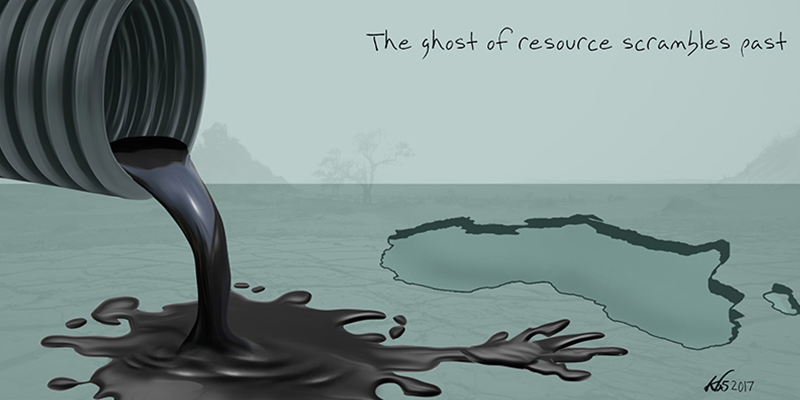The exploitation of ‘free’ wage labour – in Marx’s double sense of those workers ‘free’ to sell their labour to whom they choose and ‘free’ of any other means of reproducing themselves – is a core characteristic of capitalist relations of production. On more than a few readings, it is the defining trait of capitalism. Wage labourers in this narrow sense have almost always made up a small fraction of the workforce across sub-Saharan Africa. In one estimate from the late 1920s, the proportion of African populations employed in wage labour ranged from 0.4 percent in Nigeria to 8.2 percent in the South African Transkei. The most recent figures from the International Labour Organization (ILO) have 85.8 percent of African workers in ‘informal’ forms of work.
So, comparing African political economies to abstract models of capitalism assuming ever-widening proletarianization would seem unlikely to tell us much. In different ways, Kate Meagher, Stefan Ouma, Horman Chitonge, and Elisio Macamo have (rightly) pointed this out on this debate series on roape.net. Yet, as Pnina Werbner shows in an excellent recent piece in ROAPE, studies of African working classes in particular have a long history of falling into precisely this trap – studying African labour primarily by comparing it to the ‘normal’ trajectories of proletarian labour in Europe.
On the other hand, it would be hard to dispute that the history of African development has long been profoundly shaped by its place in a world economy that is undeniably capitalist. Indeed, the development of the contemporary capitalist world economy fundamentally depended on the mobilization of African labour through the slave trade and the colonial plunder of African resources. Equally, the present context is marked by, among other things, large-scale land grabbing, extractivist development models, increasingly volatile prices for agricultural commodities, and the vicissitudes of private foreign debt. It would be difficult, in short, to understand contemporary patterns of African political economy without reference to their location in capitalist circuits of accumulation. There’s a danger, then, that in jettisoning ‘capitalism’ altogether from our studies of African political economies we risk missing important dynamics. Yet, as Jörg Wiegratz – the editor of this series – illustrates in a recent post in this series, current debates in African studies have often fallen into this trap as well.
It would be hard to dispute that the history of African development has long been profoundly shaped by its place in a world economy that is undeniably capitalist.
So, we’re left with a paradox: African political economies, and especially their myriad labour regimes, don’t look much like conventional understandings of ‘capitalism’, but capitalism as a system of accumulation couldn’t exist in its current form without Africans and their (often non-proletarian) labour. Moreover, we can’t make much sense of the history and development of African political economies without some reference to capitalism as a system of accumulation on a global scale. I want to suggest in this post that the way forward here is, rather than asking what ‘capitalism’ tells us about Africa, we should be asking: ‘what does African labour tell us about capitalism?’
Placing African labour in capitalism
One promising direction here comes from critical political economists who have, in various ways, sought to place informal and unfree work in sub-Saharan Africa in the circuits of global capital. Marxian writers on unfree labour have pointed to the crucial role played by unfree forms of exploitation in facilitating contemporary global patterns of accumulation, including in Africa. ‘Informal’ work too, as Kate Meagher reminds us in her contribution to this debate series, is still often linked into global production networks through a variety of precarious forms of exploitation. For instance, seasonal agricultural workers play a vital role in producing cash crops for export; and labour brokers employing workers on hyper-casualized, temporary contracts are rife in the construction industry in many urban centres across the region.
Such interventions are vital, in no small part because these perspectives have enabled important critiques of the policy frameworks rolled out by the International Labour Organization (ILO), World Bank, and others around irregular forms – in which African labour has often played a central role. These frameworks have tended to treat informal economies, forced labour, and other forms of non-standard work as the products of the exclusion of certain workers from the normal workings of global capitalism. In 2002, for instance, in an ILO report on Decent Work and the Informal Sector, the relationship between informal work and ‘globalization’, is described as follows: ‘Where the informal sector is linked to globalization, it is often because a developing country has been excluded from integration into the global economy.’ The ILO increasingly suggests that these ‘exclusions’ from the global economy are compounded by ineffective regulation.
The main alternative to the ILO’s perspective in discussions of informal labour is the brand of institutional economics widely adopted by the World Bank. Here ‘informality’ becomes a form of poor people’s empowerment in the face of overregulation by the state, a reflection of entrepreneurial instincts to be encouraged by developing appropriate institutions. Policy initiatives to promote micro-enterprise development, access to credit, skills, and property rights follow logically from this way of thinking about the ‘informal.’ Here again, informality is understood in terms of exclusion from the normal operation of market forces.
African political economies, and especially their myriad labour regimes, don’t look much like conventional understandings of ‘capitalism’, but capitalism as a system of accumulation couldn’t exist in its current form without Africans and their (often non-proletarian) labour
In either case, policies designed without regard for the ways in which ‘informal’ work is embedded in wider capitalist economies are unlikely to be effective – at best they can offer half solutions that treat the symptoms rather than the causes of dispossession. Yet, there is still an important corollary that has often gone under explored. In practice, the lines between, say, ‘formal’ and ‘informal’ labour relations are indeed fluid and irregular forms of work are indeed integral to capitalist accumulation. But, as I argue in my recent book, The Global Governance of Precarity, the drawing of those boundaries themselves, and the implicit relegation of ‘informal’ or violent modes of exploitation to aberrant spaces outside the ‘normal’ workings of capitalism, are not just conceptual questions of concern to scholars of (African) political economy. They are fundamentally political ones, they are the artefacts of specific, historical, patterns of struggle and practices of governance. African labour, notably, has historically long been at the centre of debates around these questions on a global scale.
Placing African labour in capitalism, then, requires that we think seriously and in historical perspective about the politics of irregular forms of work. The kinds of work performed by African workers have often been key reference points in global debates about governing irregular forms of work. The ILO’s first convention on forced labour from 1930, for instance, was debated and negotiated through the 1920s in the context of growing concerns about colonial labour practices in Africa. But, as I show further in the remainder of this piece, such frameworks have always been contested, and often shaped in powerful ways by the unfolding and contingent relationships between the state and various segments of working classes.
The origins of ‘informality’
The concept of ‘informal’ work, to cite a particularly important example, was popularized in no small part by a major ILO mission to Kenya under the auspices of the World Employment Programme (WEP). This WEP mission to Kenya in 1972, relied quite centrally and explicitly on the assumption that the ‘formal’ and ‘informal’ were discrete spheres, the latter defined by its exclusion from the world economy. Hence, the core of the strategy laid out in the ILO report: ‘Our strategy of a redistribution from growth aims at establishing links that are at present absent between the formal and informal sectors.’
It’s worth pointing out that, while the concept of ‘informality’ was new in the 1970s, it clearly echoed colonial dichotomies between ‘modern’ (implicitly urban, capitalist, and Europeanized) and ‘traditional’ (rural, tribal, African) sectors of the economy. The fact that Africans were increasingly moving from supposedly ‘non-capitalist’ spaces in the countryside into ‘capitalist’ ones in the city was the source of much consternation for colonial officials and ILO staffers in the decade after WWII. ‘Development’ and economic growth were increasingly identified with the movement of people from (non-capitalist) ‘traditional’ activities in the countryside into (capitalist) ‘modern’ employment in urban spaces, and the concomitant increase in labour productivity– as in, for instance, W. Arthur Lewis’ seminal work. But colonial policy-makers increasingly fretted about how to manage these transitions, and how to govern those ‘classes of wage-earners who… could no longer rely on the solidarity engendered by the family or tribal community… and were consequently vulnerable to the ordinary risks of life and to the fluctuations of employment’, and about ‘the danger of permitting towns to expand beyond a certain limit; then they became unwieldy to administer and control.’
The preparatory work for the ILO mission to Kenya very clearly echoed similar concerns: ‘Perhaps more important than all the rest, there seems to exist, in Kenya, a very notorious dualism between the prosperous basis of certain aspects of the economic picture, highly productive farm units, relatively good infrastructure, sophisticated financial services, high-quality education, by European standards, in some schools, and the majority of the population.’ The concept of the ‘informal’ economy perhaps broke down the strict rural-urban dualism often implicit in these older statements – pointing, in effect, to ‘non-capitalist’ forms of work in urban spaces. However, it still very much framed the reduction of urban poverty in terms of finding ways of progressively incorporating African workers into global capitalism.
These perspectives were problematic. As a host of critics at the time – including figures like Colin Leys and Richard Sandbrook – pointed out, ‘informal’ economies often subsidized social reproduction in the context of low wages in the ‘formal’ sector. Among other things: street vendors provided cheap food and clothing, informal domestic labour directly enabled the reproduction of wage work, and ‘informal’ employment often supplemented the incomes for ‘formal’ workers and their households in the context of declining real wages. And in the region more broadly, dichotomies between ‘formal’ and ‘informal’, or ‘rural’ and ‘urban’ economies, or ‘modern’ and ‘traditional’ sectors, tended to occlude the ways in which individual workers and households often relied on livelihood strategies that cut across these areas of activity. In short, the concept of the ‘informal’ neatly excluded the ways in which irregular forms of work in Kenya were already linked with properly ‘capitalist’ accumulation in Kenya, particularly in subsidizing the very low wages paid by multinational firms operating in Kenya.
The preparatory work for the ILO mission to Kenya very clearly echoed similar concerns: ‘Perhaps more important than all the rest, there seems to exist, in Kenya, a very notorious dualism between the prosperous basis of certain aspects of the economic picture, highly productive farm units, relatively good infrastructure, sophisticated financial services, high-quality education, by European standards, in some schools, and the majority of the population
But, contemporary critics, like present-day political economists, too often stopped the argument there. The very things that made governing the ‘informal’ an inadequate means of addressing poverty also made it an effective political tool – it blocked any serious consideration of the structural roots of poverty, focusing instead on a relatively narrow set of technical responses aimed at fostering ‘links’ between formal and informal activity. Framing urban poverty in terms of ‘informality’ dovetailed with and helped reinforce a structure of state authority that sought to restrict any independent voice for labour in shaping development strategy. The WEP mission, it is worth noting, followed a period of consolidation and depoliticization of the labour movement. Kenya’s Central Organization of Trade Unions (COTU) had been formed in 1965 when the government dissolved the Kenya Federation of Labour (KFL) and the rival Kenyan African Workers’ Congress. The KFL had split over interlinked personal disagreements among the leadership, questions of international affiliation, and the ‘political’ independence of trade unions. The new COTU was led by the factions aligned to the government, and it was prevented from pursuing ‘political’ action. The government also identified unions the primary cause of unemployment in the 1970 report of the Parliamentary Select Committee on Unemployment in 1970 – high levels of wage disparity between urban and rural areas, partly ‘as a result of the trade union activities’ were blamed for excessive rural-urban migration and the resort of capital to labour-saving technologies. The diagnosis of urban poverty as the result of the (non-capitalist) informal character of the forms of work performed by most Kenyans dovetailed well with this set of political dynamics.
Irregular work in neoliberal Africa
Irregular forms of labour have increased in numbers and political salience across much of sub-Saharan Africa in the neoliberal era. Structural adjustment brutally undercut working class livelihoods across the region, often prompting widespread protests and undercutting the legitimacy of many single-party governments. At the same time, the means through which postcolonial states had often disciplined strategically important segments of working classes – close links between trade unions and ruling parties in particular – were often severely damaged by structural adjustment. This pattern of failure, backlash, and state restructuring is crucial to understanding the re-articulation of policies towards ‘informal’ economies and ‘forced labour’ from the 1990s onwards. On one hand, neoliberal strategies of governance often shifted towards more localized, community-level interventions dealing with health, education, microfinance as mechanisms for poverty reduction in the aftermath of the failures of structural adjustment. On the other, the growth of irregular work and dismantling of postcolonial institutions often raised the strategic importance of finding new means of governing informal economies for African states. These dynamics have often dovetailed in the ILO’s work.
A useful example here comes via the ILO’s increasing promotion of ‘microinsurance’ policies as a means of providing social protection to ‘informal’ workers. Microinsurance refers to a range of simplified insurance products with very low premiums, targeted primarily at ‘informal’ workers lacking conventional social security. Officials in the Social Protection Department of the ILO initially used the concept of ‘microinsurance’ in the late 1990s to refer to means of providing alternative modes of social protection to informal workers left out of both state provision and market-based schemes, through ‘community-based’ forms of social protection. Since the early 2000s, microinsurance is increasingly promoted by a broader complex of organizations, including financial regulators, and framed in terms of ‘financial inclusion’, a shift that has been accompanied by a growing emphasis on promoting the development of commercial markets.
On a basic level, microinsurance boils down to an alternative, privatized means of providing social protection and healthcare, to informal workers not covered by conventional contributory social security. Making a market for small-scale, simplified insurance products, then, is a way of bringing excluded workers into the ‘normal’ workings of the state and market. It serves to deepen the commodification of labour insofar as it requires workers to find means of paying premiums on an ongoing basis even for the management of the vulnerabilities implicit in deregulated labour markets themselves.
As a means of reducing poverty and managing insecurity for ‘informal’ workers, microinsurance thus leaves a good deal to be desired. It is a quintessentially neoliberal solution which downloads responsibility for the provision of social protection onto poor individuals and communities, and again relies on an understanding of ‘informal’ workers as being excluded from the ‘normal’ workings of proletarian labour relations. It thus shares many of the same shortcomings as the related promotion of microcredit (expertly dismantled in Milford Bateman’s recent contribution to this debate). At best, this kind of scheme risks reinforcing a decidedly two-tiered system of social protection, with shrinking state pensions supporting a shrinking core of salaried workers and the remainder of the population covered by a privatized system partially underwritten by state subsidies.
Microinsurance makes sense as a political intervention in a context in which a growing proportion of the working population is involved in irregular forms of work. The rigid political distinction between formal and informal work implicit in the model of ‘responsible participation’ is no longer viable in the context of deindustrialization, privatization, and the casualization of work in a number of key industries. As with the Kenyan mission, the promotion of microinsurance diagnoses ‘informality’ as a result of exclusion from the normal workings of global capitalism and seeks to reduce poverty by forging new kinds of links. In obscuring the ways in which urban informality remains bound up with wider patterns of neoliberalization and capitalist restructuring, it similarly lends itself to depoliticized solutions.
I have two big points to underline here. First, debates about African labour and its links to global capitalism are never simply abstract or conceptual debates of purely academic interest. A big task for critical political economy needs to be confronting the ways in which the links between the irregular forms of work that are predominant in Africa (and increasingly elsewhere) and the global circuits of capital accumulation are governed and understood. These are crucial sites of political contestation and are closely entangled with broader patterns of political authority and state restructuring.
Second, and more broadly, if our frameworks for understanding ‘capitalism’ don’t allow us to make sense of African political economies, we should be reflecting on how African experiences push us to rethink those frameworks, rather than necessarily debating the value of ‘capitalism’ as a concept. One initial way of doing this, I think, is to suggest that the history of irregular work in Africa highlights the deeply political nature of our understandings of capitalism, and the contested understandings of the placement of irregular forms of labour performed by African workers in relation to global circuits of accumulation.
–
This article was published in the Review of African political Economy (ROAPE).








